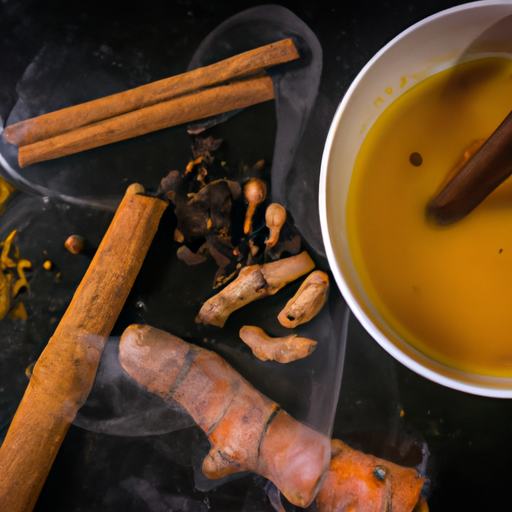When handed lemons by life, turn them into lemonade. However, if life presents you with a sore throat, what’s the next step? Whip up some turmeric tea!
Turmeric has been used for centuries in Ayurvedic medicine to treat inflammation and improve overall health. It contains a compound called curcumin, which has anti-inflammatory and antioxidant properties that may help relieve symptoms of sore throat.
In this article, I will guide you through the process of making turmeric tea for sore throat relief. With just a few simple ingredients and steps, you can create a soothing drink that may help ease your discomfort and speed up your recovery.
So let’s get started!
Key Takeaways
- Turmeric tea is made with fresh turmeric root, ginger, honey, lemon, and water and has anti-inflammatory and antioxidant properties.
- Drinking enough water is essential for overall health and well-being, and grating fresh turmeric and ginger maximizes their health benefits.
- Letting the mixture simmer for about 10 minutes to infuse flavors and benefits and drinking turmeric tea regularly can improve overall health and reduce the risk of getting sick.
- Other tips for soothing a sore throat include staying hydrated, avoiding irritants, gargling with warm salt water or apple cider vinegar, drinking warm liquids like tea, and resting.
Gather Your Ingredients
To make a soothing turmeric tea for a sore throat, you’ll need fresh turmeric root, ginger, honey, lemon, and water. I always keep these ingredients in my kitchen because they offer many health benefits and can help alleviate discomfort caused by a sore throat.
In this discussion, I’ll guide you through the steps to create a delicious cup of turmeric tea. It’s both comforting and healing.
Fresh Turmeric Root
Using fresh turmeric root adds a vibrant and zesty flavor to your sore throat tea. Not only does it taste great, but it also provides an array of health benefits. Turmeric has been used for centuries in traditional medicine for its anti-inflammatory properties, which can help reduce swelling and irritation in the throat.
Additionally, turmeric contains antioxidants that may boost immunity and fight off infections. To make turmeric tea for a sore throat, you can use either fresh or powdered turmeric root. However, using fresh turmeric root will provide a stronger flavor and more potent health benefits.
To prepare the root, simply peel away the outer skin with a vegetable peeler or spoon and grate or finely chop it before adding it to your tea mixture. Now let’s move on to our next ingredient: ginger.
Ginger
Ginger adds a spicy kick to your throat-soothing concoction, and it’s a staple ingredient in many culinary dishes. This root has been used for centuries for its health benefits and culinary uses. Here are some reasons why you should consider adding ginger to your turmeric tea:
-
Health benefits: Ginger is known for its anti-inflammatory properties, which can help reduce inflammation in the body and alleviate sore throat symptoms. It also contains compounds that have antimicrobial properties, making it an effective natural remedy for colds and flu.
-
Culinary uses: Ginger is widely used in cooking, particularly in Asian cuisine. It adds flavor and depth to soups, stir-fries, curries, and marinades. In addition to its strong taste profile, ginger is also versatile enough to be used in desserts like gingerbread or ginger snaps.
As we move onto discussing honey as another key ingredient in this recipe, keep in mind that the combination of ginger and honey can provide additional health benefits and enhance the overall taste of your turmeric tea.
Honey
Honey is a natural sweetener that not only adds flavor to your drink but also provides various health benefits. It has been used for centuries as a home remedy for many ailments, including sore throats. Honey has anti-inflammatory and antibacterial properties that can soothe the throat and reduce irritation.
In addition to its use in tea, honey can be incorporated into other home remedies for overall health. For example, mixing honey with cinnamon can help boost your immune system and relieve cold symptoms. Consuming raw honey regularly may also help improve digestion and promote healthy skin. With all these potential benefits, it’s no wonder why honey is often considered a superfood!
Transitioning into the next section about ‘lemon’, adding lemon juice to your tea can provide additional health benefits such as vitamin C to boost your immune system.
Lemon
When life gives you lemons, add a squeeze to your turmeric tea for a tangy twist that can not only enhance the flavor but also boost your immune system. Lemon is packed with vitamin C, which helps fight off infections and supports the production of white blood cells in our body. Additionally, lemon has antioxidant properties that protect against free radicals and reduce inflammation.
Aside from its benefits in tea, lemon water has become increasingly popular due to its detoxifying effects on the body. Drinking lemon water first thing in the morning can aid digestion, improve skin complexion, and even promote weight loss. Other uses for fresh lemons include adding it to salad dressings or marinades for added flavor and acidity.
Moving onto our next step, let’s talk about the importance of water when making turmeric tea for sore throat.
Water
Don’t underestimate the power of water – it’s a crucial component in creating a delicious and soothing drink that can help alleviate discomfort in your throat. Drinking enough water is essential for overall health and well-being, but it becomes even more important when you’re dealing with a sore throat.
When you’re dehydrated, your throat can become dry and irritated, which only worsens the pain. That’s why staying hydrated is one of the best things you can do to ease your symptoms.
In addition to helping soothe your sore throat, drinking plenty of water offers many other benefits. It helps flush out toxins from your body, keeps your skin looking healthy and radiant, aids digestion, and boosts energy levels.
So if you want to feel better faster, make sure you’re getting enough fluids throughout the day.
With all these benefits of hydration in mind, let’s move on to preparing our ingredients for turmeric tea.
Prepare Your Ingredients
To prepare my ingredients for making turmeric tea for a sore throat, I start by grating the turmeric and ginger roots. This helps to release their natural oils and maximize their health benefits.
Next, I slice a lemon into thin rounds to add a refreshing citrus flavor and boost the tea’s vitamin C content. These steps are essential in ensuring that my turmeric tea is not only tasty but also packed with immune-boosting properties.
Grating the Turmeric and Ginger
First, you’ll need to grab a grater and grate about a tablespoon of fresh turmeric and ginger. Not only do these ingredients add flavor to your tea, but they also offer numerous health benefits. Turmeric has anti-inflammatory properties that can help soothe sore throats, while ginger has natural pain-relieving effects and can help clear congestion.
When grating the turmeric and ginger, be sure to use gloves or wash your hands thoroughly afterwards to avoid staining. Additionally, if you don’t have fresh turmeric or ginger on hand, you can use ground versions of both instead. Experiment with different ratios of each ingredient to find the perfect balance for your taste buds.
Now that your turmeric and ginger are grated and ready to go, it’s time to move onto slicing the lemon for an added boost of vitamin C in your tea.
Slicing the Lemon
Now it’s time to add a burst of citrus by slicing the lemon for your turmeric tea. Lemon is not only known for its tangy taste, but also for its high content of vitamin C. This powerful antioxidant helps boost our immune system and fights off infections, making it a great addition to this sore throat remedy.
When it comes to turmeric tea variations, some people prefer to add honey or cinnamon for sweetness while others like to experiment with different herbs such as mint or chamomile. However, adding a slice of lemon is one variation that shouldn’t be missed!
Once you’ve sliced the lemon, set it aside and move onto boiling the water and adding the turmeric and ginger for the next step.
Boil the Water and Add the Turmeric and Ginger
Once the water’s boiling, simply add in the turmeric and ginger for an extra kick of flavor and soothing properties. Turmeric contains curcumin, which is known for its anti-inflammatory properties that can help alleviate sore throat symptoms. It’s also been shown to have antioxidant effects, boosting overall immune health.
There are various ways to make turmeric tea variations depending on your preference. You can add other ingredients like honey or lemon juice to enhance the taste or incorporate different herbs like cinnamon or black pepper for added health benefits. However, keep in mind that adding too much of these ingredients may alter the therapeutic properties of turmeric.
Let the mixture simmer for about 10 minutes while stirring occasionally. This will allow all the flavors and benefits from the turmeric and ginger to infuse into the water properly. Afterward, strain out any solids and serve hot or chilled with a slice of lemon if desired.
The next step is letting it cool before drinking, so be sure not to burn yourself when serving!
Let the Mixture Simmer
Hey, don’t be impatient and start scrolling through your phone while you let the mixture simmer for 10 minutes. Give those flavors a chance to really infuse into the water and create a deliciously soothing beverage.
Simmering techniques play an important role in this step because it allows the turmeric and ginger to release their natural oils, which gives this tea its signature flavor. You’ll know when it’s done simmering when the water turns a vibrant yellow color.
Flavor variations are another aspect to consider during this step. If you want your tea to have a stronger taste, increase the amount of ginger or turmeric used. Alternatively, adding honey or lemon can also add a sweet or tangy twist to your drink. Experiment with different ingredients and find what works best for you!
Once the 10 minutes are up, it’s time to strain the mixture before drinking. Using a fine mesh strainer, pour the liquid into your cup and discard any leftover solids.
Now that we’ve infused our tea with all those wonderful spices, we’re ready for the final step: sit back, relax, and enjoy our warm cup of turmeric tea!
Strain the Mixture
After simmering the mixture for 10 minutes, it’s time to strain it using a fine mesh strainer and pour the liquid into your cup. Straining the turmeric tea is an important step as it removes any small particles or impurities from the liquid. This results in a smoother and clearer tea that is easier to drink.
Aside from improving its appearance, there are also several benefits of drinking strained turmeric tea. The strained tea has a higher concentration of curcumin, which is known for its anti-inflammatory properties. Additionally, by removing any impurities from the mixture, you are reducing the risk of ingesting harmful substances that may be present in unstrained teas.
There are alternative methods to straining the turmeric tea if you do not have a fine mesh strainer on hand. You can use a cheesecloth or coffee filter instead to achieve similar results. However, keep in mind that these alternatives may take longer and require more effort compared to using a mesh strainer. Once you’ve strained your tea, add honey and lemon to taste for added flavor and throat-soothing benefits without having to take another step.
Add Honey and Lemon to Taste
Now that the mixture’s been strained, it’s time to add some sweetness and tanginess to your turmeric tea. In my opinion, the perfect combination for this is honey and lemon. However, if you’re not a fan of either or both of these ingredients, there are alternative options available.
One great honey substitute is maple syrup. It adds a similar level of sweetness while also providing additional health benefits such as antioxidants and anti-inflammatory properties. Another option is stevia, a natural sugar substitute that can be used in place of honey or sugar.
If you don’t have any lemons on hand or simply don’t prefer their taste, try using lime instead. It provides a similar level of acidity and freshness without the overpowering flavor that some people associate with lemons. Other citrus fruits like oranges or grapefruits can also be used as substitutes.
Once you’ve added your desired amount of honey (or substitute) and lemon (or substitute), stir well until everything is fully incorporated into the tea.
Now it’s time to sit back, relax, and enjoy your homemade turmeric tea for sore throat relief.
With all these ingredients combined in one cup of tea, you’ll soon discover why turmeric has been used for centuries as an effective home remedy for sore throats. Let’s explore its benefits together!
Benefits of Turmeric Tea for Sore Throat Relief
You’ll love the benefits of drinking this golden-colored beverage when you’re feeling under the weather. Turmeric tea has been used for centuries as a natural remedy for various ailments, including sore throat relief. It contains anti-inflammatory properties that help reduce inflammation in the throat, making it an ideal alternative to over-the-counter medications.
In addition to its anti-inflammatory properties, turmeric tea also contains curcumin, a powerful antioxidant that helps boost your immune system. Drinking turmeric tea regularly can help improve your overall health and reduce your risk of getting sick. If you don’t want to drink turmeric tea every day, you can also take turmeric supplements to get similar benefits.
While there are many alternative remedies for sore throat relief, turmeric tea is one of the most effective and easy-to-make options available. Incorporating this warm and soothing beverage into your daily routine can make a big difference in how quickly you recover from a sore throat.
Other tips for soothing a sore throat include staying hydrated, avoiding irritants like smoke or pollution, and taking over-the-counter pain relievers if necessary.
Other Tips for Soothing a Sore Throat
When I have a sore throat, there are a few other tips that I find helpful besides drinking turmeric tea.
One of them is gargling with salt water. This can help to reduce inflammation and soothe the throat.
Another tip is to drink warm liquids, such as soups or herbal teas, which can help to lubricate the throat and provide relief.
Finally, it’s important to get plenty of rest when you have a sore throat, as this allows your body to focus on healing itself.
Gargling with Salt Water
Before taking a sip of your turmeric tea, relieve your sore throat by gargling with warm salt water. Gargling with salt water is a simple and effective way to reduce inflammation and soothe the pain associated with a sore throat.
Here are some benefits of gargling and some alternative options to using salt water:
- Gargling helps remove mucus and other irritants from the throat.
- Salt water reduces swelling by drawing out excess fluids from tissues in the throat.
- Gargling can help prevent infections by flushing out harmful bacteria or viruses.
- Using warm water instead of cold can provide additional relief by relaxing muscles in the throat.
If you find that using salt water doesn’t work for you, there are other alternatives that may be worth trying. Some people prefer to use honey and lemon mixed into warm water, while others opt for apple cider vinegar diluted in warm water. Regardless of which method you choose, remember to always spit out the solution after gargling.
After gargling with warm salt water or an alternative solution, it’s time to enjoy your turmeric tea! Drinking warm liquids like tea can further help soothe a sore throat by providing hydration and warmth.
Drinking Warm Liquids
To ease your discomfort, try indulging in warm liquids like tea. Drinking warm fluids can help soothe a sore throat by providing moisture and warmth to the affected area. The benefits of hydration can’t be overstated when it comes to managing sore throats, as drinking enough fluids helps keep the mucus membranes moist and supports the body’s natural healing process.
When it comes to temperature, it’s important to avoid beverages that are too hot or too cold. Hot liquids like tea should be enjoyed at a comfortable temperature that won’t scald your mouth or irritate your throat further. On the other hand, cold drinks can cause constriction of blood vessels in the throat and lead to increased swelling and inflammation. So opt for warm liquids like turmeric tea instead, which not only provides soothing comfort but also contains anti-inflammatory compounds that can reduce pain and swelling.
Transitioning into our next step, rest is also an essential component in helping manage sore throats.
Resting
Drinking warm liquids can definitely help soothe a sore throat, but it’s not the only thing you should do. It’s important to rest your body so that it can focus on fighting off the infection causing your sore throat.
Resting is essential for our overall health and well-being, and it can be especially crucial when we’re feeling under the weather. When I’m sick with a sore throat, I make sure to prioritize resting as much as possible.
Here are some tips I’ve found helpful:
- Take naps throughout the day
- Avoid strenuous activities like exercise
- Try using relaxation techniques like deep breathing or meditation
- Stay in bed or on the couch as much as possible
The importance of resting when you’re sick cannot be overstated. By giving your body time to heal and recover, you’re enabling it to work at its best capacity and fight off infections more effectively.
So next time you’re feeling under the weather with a sore throat, remember that drinking warm liquids alone won’t cut it – make sure you give yourself plenty of time to rest and recover too.
Frequently Asked Questions
What are some possible side effects of drinking turmeric tea?
When it comes to drinking turmeric tea, there are some potential side effects that you should be aware of. Despite its many health benefits, consuming too much turmeric can lead to digestive issues such as nausea and diarrhea.
Additionally, some people may experience allergic reactions to turmeric, so it’s important to monitor your body’s response if you’re trying it for the first time. To avoid any negative effects, it’s recommended to stick to a moderate dosage and timing when drinking turmeric tea.
Overall, while there are certainly precautions to keep in mind when consuming this powerful spice, the potential turmeric tea benefits make it worth considering as a regular part of your diet.
Can turmeric tea be made in advance and stored for later use?
Turmeric tea storage is a topic that has been debated for some time now. There are those who believe that it can be made in advance and stored for later use, while others think that it should be prepared fresh every time.
While there is no doubt that turmeric tea has many health benefits, it’s important to consider the potential risks associated with storing it. The main concern when preparing turmeric tea in advance is the loss of its active ingredients over time. Turmeric contains volatile oils and other compounds that can quickly degrade when exposed to air, light, or heat, leading to a loss of potency and effectiveness.
Therefore, if you want to get the most out of your turmeric tea, it’s best to prepare it fresh each time you want to drink it. However, if you must store your turmeric tea for later use, make sure to keep it in an airtight container away from direct sunlight and heat sources.
How often should turmeric tea be consumed for maximum sore throat relief?
As someone who’s suffered from sore throats in the past, I can confidently say that incorporating turmeric tea into your routine can provide significant relief.
In terms of frequency of consumption, it’s recommended to drink turmeric tea at least once a day, preferably in the morning or evening.
It’s important to note that timing of consumption can also play a role in maximizing its benefits. Drinking turmeric tea on an empty stomach allows for better absorption and utilization of its anti-inflammatory properties.
While it’s not necessary to consume turmeric tea every day for sore throat relief, consistently drinking it as part of a healthy lifestyle can certainly contribute to overall wellness.
Can turmeric tea be used in combination with other natural remedies for sore throat relief?
Combining remedies can be a great way to tackle a sore throat from multiple angles and maximize your chances of relief. There are many natural remedies that can work well together, such as honey, ginger, and lemon.
Adding turmeric tea to the mix can provide additional health benefits as it’s known for its anti-inflammatory properties. However, it’s important to note that too much of a good thing can also be harmful, so it’s best to stick with recommended dosages and not overdo it on any one remedy.
Always consult with your healthcare provider before trying new remedies or combinations.
Are there any medical conditions or medications that would interact negatively with turmeric tea?
When considering turmeric tea as a natural remedy for sore throat relief, it’s important to take into account any potential drug interactions or underlying health conditions.
Turmeric may interact with certain medications, such as blood thinners and diabetes medications, and should be avoided in those cases.
Additionally, individuals with gallbladder problems or bile duct obstructions should also avoid consuming large amounts of turmeric.
It’s always recommended to consult with a healthcare provider before incorporating any new remedies into your routine, especially if you have pre-existing medical conditions or are taking prescription medications.
Conclusion
Well, I tried making turmeric tea for my sore throat and it was a complete disaster. The water boiled over, the turmeric stained everything, and I couldn’t get the taste right.
But hey, don’t let that discourage you from trying! Making turmeric tea can be easy and effective in soothing your sore throat. Turmeric has anti-inflammatory properties which can help reduce pain and swelling in your throat.
Adding ginger, honey, and lemon will not only enhance the flavor but also provide additional benefits such as boosting immunity and aiding digestion. So don’t be like me, gather your ingredients, prepare them carefully, and simmer away.
Your throat will thank you for it!










